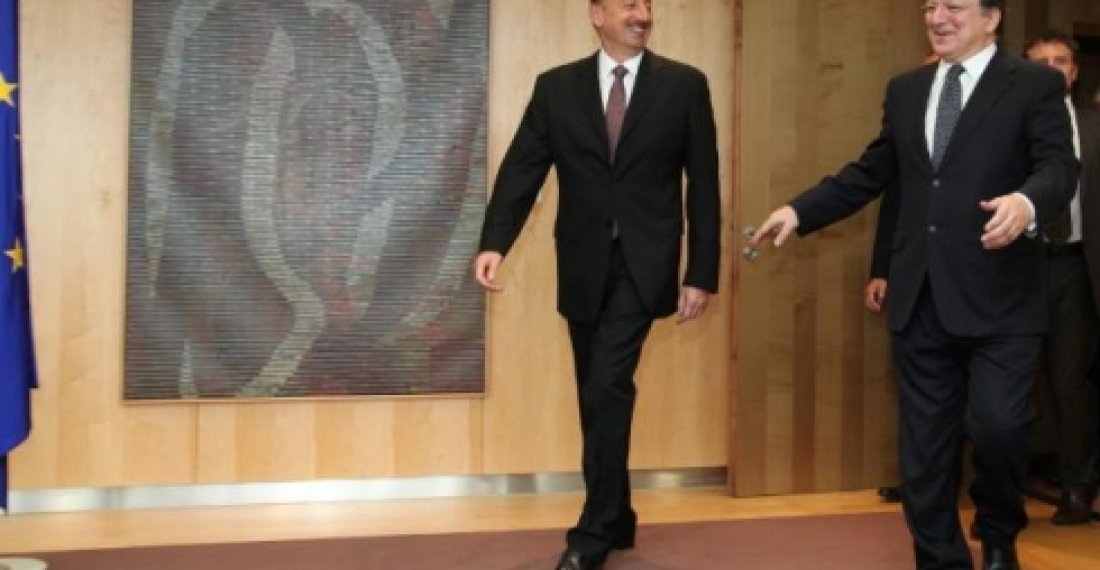President Ilham Aliev of Azerbaijan yesterday visited the European institutions in Brussels. He met the President of the European Council, Herman van Rompuy and the President of the European Commission Jose Manuel Barroso. Discussions focused on the future of Azerbaijan's relations with the European Union, issues of tangible cooperation particularly connected with energy, and questions of democratisation and human rights.
Speaking after his meeting with the Azerbaijani leader, President Herman van Rompuy said
"EU-Azerbaijan relations are good. Our long term committment is to strenghtening our relations even further by working towards concluding negotiations on the Association Agreement. With an Association Agreement our relationship can achieve its full potential". Van Rompuy said that he had reminded President Aliev "of the European Union's very firm ambition to achieve a long term association with Azerbaijan, with democracy and shared values at its core, in particular human rights and fundamental freedoms."
The theme was later echoed by the President of the European Commission, Jose Manuel Barroso. who told President Aliev that "2013 is indeed a year of great opportunity for EU-Azerbaijan relations. I stand for broader and deeper relations with your nation, a country which we very much respect, with energy as an excellent starting point and with shared values at the core."
Energy dominated the discussions in the meetings between President Aliev and EU leaders. As President Barroso said at the conclusion of the visit, the stakes are quite high. Referring to the new gas pipeline project that will connect Azerbaijan to European energy markets Barroso said: "The Southern Gas Corridor is not a theoretical project on the drawing board. It is about to be realized, to the benefit of all involved. It will bring initially 10 billion cubic meters to Europe by 2019, but we will not stop here. The Corridor could in the medium term cover more than 10% of our annual needs in Europe and thus contribute to our energy security, price stability, growth and jobs. This is our common vision as President Aliyev and I agreed in 2011. This is what we will keep working for, to enhance our mutual security of supply. We believe this is in the best interest of Europe and Azerbaijan."
On his part President Aliev also highlighted the importance of relations with the EU for Azerbaijan. He said “Azerbaijan wants to be close to Europe as much as possible.” Aliev reiterated that Azerbaijan and the EU are continuing cooperating within the framework of the Eastern Partnership program. Ilham Aliyev expressed his thanks to the European institutions for supporting Azerbaijan’s development, including in the area of human rights. “This support helps Azerbaijan carry out reforms in line with the high world standards,” he said.
Commonspace.eu political editor said in a comment:
"The visit of President Aliev to the European institutions in Brussels came at a very decisive moment in EU-Azerbaijan relations. The two sides understand that this is a defining moment for these relations and that they now need either to deepen their relationship or distant themselves from each other. It seems from the tone and the atmosphere during the Brussels meetings that the two sides have decided to take the relationship forward. This requires balancing the economic side of the co-operation, particularly in the energy sector, with a sound political basis, particularly related to issues of governance and human rights. Both sides now recognise that these processes cannot be separated. The next few weeks will show if words can now be translated into deeds. The decision on the Southern Energy Corridor is due in the next days. President Barroso has hinted that in the long term both options that are currently being considered may be implemented, but for the moment a clear choice will set the process of construction in motion. In the political sphere Azerbaijan will hold Presidential elections in October. It is clear that much depends on how these elections are conducted and on the ability of the Azerbaijani leadership to conduct elections that are not only technically well organised, but that are held in an atmosphere that will allow the Azerbaijani people to elect their leader in a free and fair environment. The message coming out from the Brussels meetings are clear. EU-Azerbaijan relations are good. Now is the time to make them better."
source: commonspace.eu with the Press Service of the European Union and agencies.
picture: President Barroso and President Aliev in Brussels on 21 June 2013. (Picture courtesy of the Press and Audio Visual Serviuce of the European Union."







